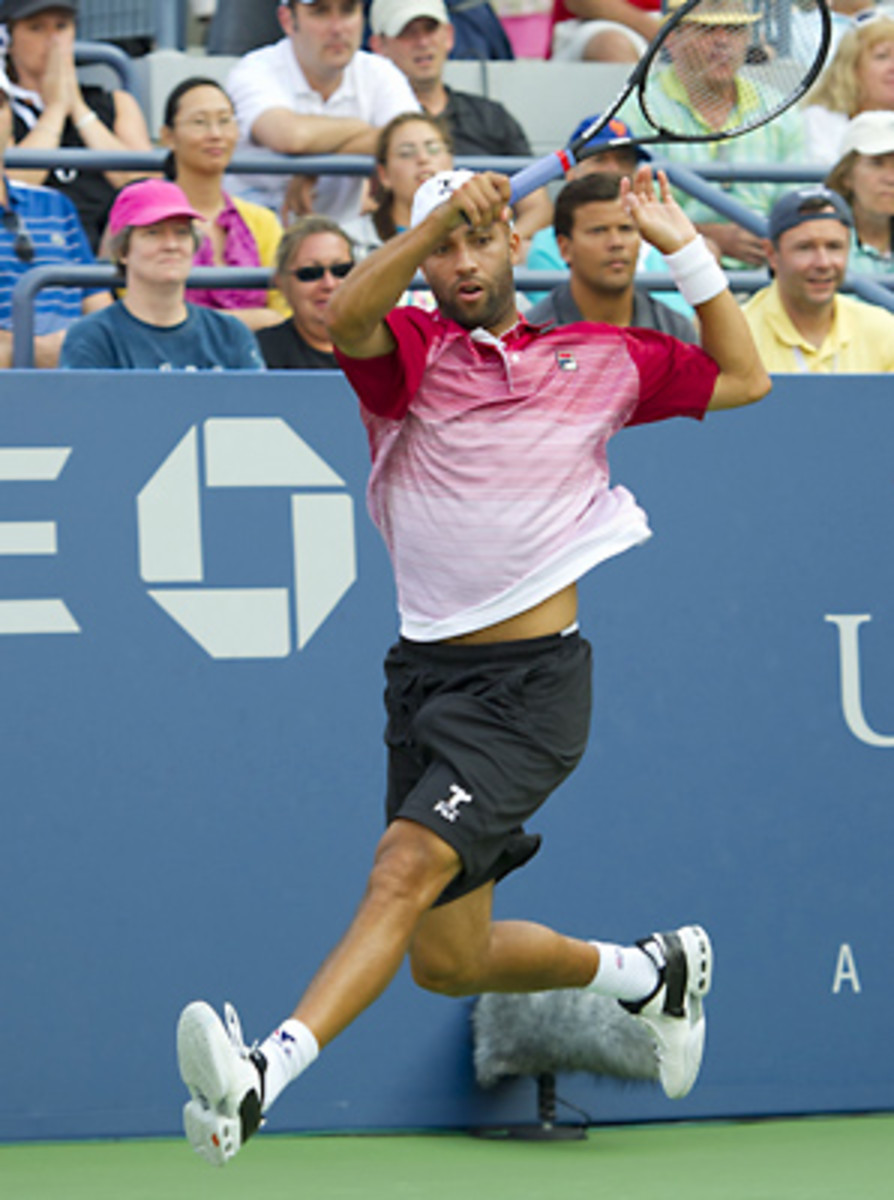Despite loss, Blake fights to stay competitive, push off retirement
NEW YORK -- It looked exactly as a James Blake match at the U.S. Open should: stadium packed to the rafters, cameras trained on his every move, big-time opponent on the other side of the net. And yet most everything about his 4-6, 3-6, 4-6 defeat to Spaniard David Ferrer on Friday seemed small.
Blake, after all, is this Slam's resident showstopper, the native son with the game that seems to grow with the venue. At Ashe Stadium, the biggest stage in the sport, he has gained lasting renown for his wee-hour thrillers; his large and boisterous personal cheering section, the J-Block; and for his habit for suffering the most heartbreaking loses in the most genial way. It was just six years ago Blake pushed Andre Agassi for five sets and almost three hours, came up short and quipped, "it couldn't have been more fun to lose."
Now here he was on the Grandstand -- the U.S. Open's smallest show court -- in the middle of the afternoon getting turned back in less than two hours by an opponent he never lost to in two previous meetings. The J-Block, which once filled a luxury box high above Ashe center court, was reduced to his mother, Betty, his brother, Thomas, and a few close friends in the Grandstand front rows. The same player who once spiraled about sleeveless was covered in short sleeves, presumably to accommodate the tiny, mismatched decals that one generally wears only in exchange for a cash handshake.
The loss was Blake's first in the second round since losing to Lleyton Hewitt in 2001. It's the sort of reality check that can drive a player to shelve his racket. Blake, 31, is at that age where the question of retirement is now a legitimate one. Afterward he confessed that the straight sets clinic was disappointing, but not that disappointing. "I'm going to keep playing until it stops being fun," he said. How close is he to that? "Not close at all."
At his peak, Blake was a flag-bearer for American tennis, an unlikely champion who overcame scoliosis, a broken neck and shingles on the way to becoming the world's fourth-best player. But in decline, he has come to represent something far more American: the notion that you can forestall the inevitable and still leave on your own terms. It's a notion that is experimented with often in tennis -- sometimes on purpose, sometimes not -- and the U.S. Open typically serves as the sport's official laboratory. It doesn't matter how rough the career winter is for a player. Turn back the clock once, and it can be summer forever. A 39-year-old Jimmy Connors was immortalized by his marathon victory over Aaron Krickstein 20 years ago. So was a 35-year-old Agassi when he edged Blake back in '05.
Now Blake is pursuing his own time capsule moment and finding the hunt challenging. The last two years have not been kind to his body, his knees in particular. It wasn't just training at his desired intensity, and legging through matches that were a pain. "It hurt just to get up in the morning," said Blake, who watched his ranking fall as low as 171 in January.
He's tried to lighten his schedule to help his body and game rebound. The only event he has played outside of the U.S. this year is Wimbledon, and he lost there in the first round to Marcos Baghdatis. But then, in a move that was equal parts egoless and desperate, Blake entered an event in Winnetka, Ill., on the Challenger circuit (tennis' triple-A league) and beat fellow American Bobby Reynolds for his first title in four years.
Since Winnetka, Blake has shown steady improvement, beating Ernests Gulbis, David Nalbandian and Baghdatis to climb back into the top 65. Blake seemed as if he might push Ferrer on Friday. He hung with the Spaniard for the first six or so games of each set, whistling the up-the-line forehand winners and sliding, about-face backhands that recalled his better days. But ultimately Blake's go-for-broke blitz was no match for Ferrer's steady retrieving and tight service games. "If [critics] watched this match, they could say a ton of bad things about how many mistakes I made on break points," said Blake, who converted just two of his nine chances. "But on the flip side, you could talk about how good David Ferrer is. The guy plays unbelievable. He's 5-foot-9, No. 5 in the world, makes a high percentage of first serves, does everything right, is as mentally tough as anyone in the world."
The prospect of going nose-to-nose with him again is enough to keep Blake going. He's happy to keep losing in the meantime so long as it doesn't cost him the game itself. "Whatever happens, I want to continue being competitive," he said. "I don't think I will ever change." It's just too bad times always do.






